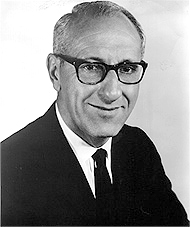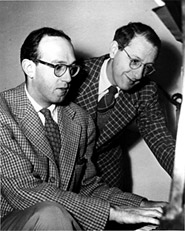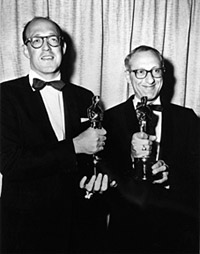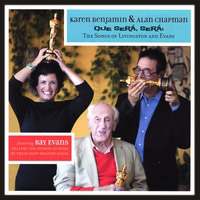February 19, 2007
Songwriter Ray Evans Dead at 92
Prolific three-time Academy Award-winner wrote timeless standards by Jon Burlingame

Together with his songwriting partner Jay Livingston, they wrote several of the 20th century's most popular songs, from Oscar-winning movie tunes to familiar television themes. They were well-known as two of the nicest guys in the business. Evans outlasted his partner by six years; Livingston died in 2001, and although Evans tried writing songs with new partners, he admitted that it was a strange experience.
They won Best Song Oscars for "Buttons and Bows" from the 1948 Bob Hope film The Paleface, "Mona Lisa" from 1950's Captain Carey, USA (a number-one hit for Nat King Cole) and "Que Sera, Sera" from the 1956 Hitchcock film The Man Who Knew Too Much (which became Doris Day's signature song).

Jay Livingston and Ray Evans, circa 1940s
They received four other Oscar nominations, for "The Cat and the Canary" from Why Girls Leave Home (1945) ; "Tammy," a number-one hit for Debbie Reynolds, from Tammy and the Bachelor (1957); "Almost in Your Arms" from Houseboat (1958); and for writing the lyrics to Henry Mancini's title song from Dear Heart (1964), which became a major hit for Andy Williams.

Livingston and Evans accepting their Best Song Oscar for "Que Sera, Sera" (1957)
One of their favorite stories involved the writing of "Silver Bells," which actually started life as "Tinkle Bells" – until Livingston's wife informed him that the word "tinkle" actually meant something else to millions of American women. They quickly replaced "tinkle" with "silver" and created a classic holiday song.
"Never Let Me Go," sung by Nat King Cole in The Scarlet Hour (1951), became a jazz classic. "I'll Always Love You," from My Friend Irma Goes West (1950), was Dean Martin's first hit record. "As I Love You," from The Big Beat (1958), became a hit for Shirley Bassey.
They also wrote two classic TV themes, Bonanza in 1959 and Mister Ed in 1961, as well as the lesser known To Rome With Love in 1969. "Bonanza" was an oddity because the lyrics ("We've got a right to pick a little fight, Bonanza!") were never heard on the show, while "Mister Ed" was unusual for the fact that Livingston himself sang the theme – a surprise to the songwriters, since they expected their "demo" track would be replaced by a legitimate singer, and never was.
The songwriters created a television landmark in 1954 by composing all of the songs for TV's first color "spectacular," Satins and Spurs, a live 90-minute special starring Betty Hutton. They also penned the score for "No Man Can Tame Me," a General Electric Theater with Gisele MacKenzie that aired in 1959.
Evans was born Feb. 4, 1915 in Salamanca, N.Y. and met his future songwriting partner Livingston during the mid-1930s while they were attending the University of Pennsylvania. Both musicians, they sailed the world as part of an orchestra that played Cunard Line steamships, and began writing songs in New York around 1940.


They also wrote for Broadway, including the score for Tony Randall's musical comedy Oh Captain! in 1958 and a short-lived George Gobel show, Let It Ride, in 1961. Even after being named to the Songwriters Hall of Fame in 1973, they remained active as tunesmiths, contributing songs to the popular Mickey Rooney-Ann Miller show Sugar Babies in 1979.
Their other collaborators over the years included Franz Waxman, Max Steiner, Percy Faith, Neal Hefti, David Rose and Jimmy McHugh.
Evans and Livingston continued to write special material for Bob Hope and charity events and, in later years, performed their best-known songs in a two-man show called "And Then I Wrote."A resurgence of interest in the Livingston & Evans catalog has been spurred by new albums including one by Michael Feinstein and another by the cabaret duo of Karen Benjamin and Alan Chapman, who had recently made several L.A. appearances with Evans and one in his hometown of Salamanca, near Buffalo, N.Y.
Evans' wife Wyn died in 2003. He is survived by a sister.
In one of his last interviews, which appeared on this website in August 2006, Evans lamented the closing of Paramount's Scoring Stage M where so many of their song hits had been recorded, among them "Mona Lisa," "Silver Bells" and "Que Sera, Sera."

©2007 Jon Burlingame